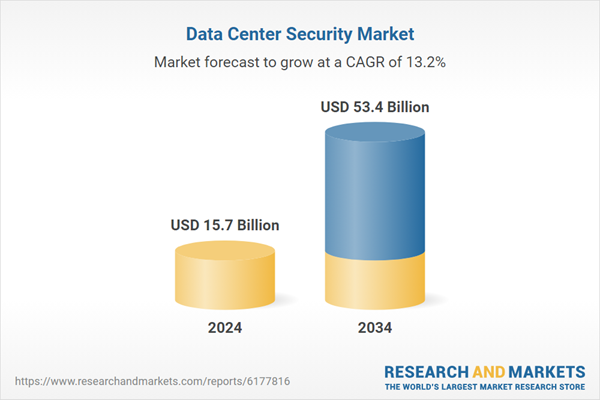As organizations continue to store and manage vast volumes of critical data, the importance of robust data center security, both physical and cyber, has grown significantly. Comprehensive protection now requires seamless coordination between incident response planning, risk assessments, continuous monitoring, and multi-layered defense systems. With businesses under constant pressure to secure customer data and maintain operational continuity, security has become a core component of data center strategy. Compliance with global standards like NIST, ISO, and region-specific regulations is not only necessary but also heavily enforced, pushing organizations to integrate governance and security management in daily operations. Companies face strict penalties and potential shutdowns if these requirements are ignored. Today’s data center environments demand more than isolated firewalls or camera systems; a fully unified security architecture has become the industry norm, involving continuous audits and real-time incident mitigation. Market growth is further supported by rising adoption of cloud infrastructure, AI-enabled security technologies, and increasing regulatory oversight across critical sectors, including finance, healthcare, and government operations.
In 2024, the solutions segment held a 75% share. This segment includes a full suite of cyber and physical security tools working together inside data center facilities. Physical solutions such as biometric access, motion sensors, fencing, alarm systems, and surveillance cameras are key to preventing unauthorized access and securing perimeter boundaries. On the cyber side, technologies like endpoint detection and response (EDR), firewalls, intrusion detection and prevention systems (IDS/IPS), cloud-native security platforms, and AI-driven monitoring solutions are designed to detect and respond to threats in real time.
The enterprises segment will grow at a CAGR of 8% between 2025 and 2034. These enterprise-run data centers serve as the backbone of critical business operations. Internal facilities managed by companies in sectors like finance, healthcare, and manufacturing prioritize a blend of physical safeguards, such as controlled access and surveillance, with cybersecurity systems that include firewalls, anomaly detection, and infrastructure monitoring. With the stakes high for protecting confidential data and meeting compliance mandates, enterprises continue to invest heavily in integrated, end-to-end security solutions.
US Data Center Security Market generated USD 4.7 billion in 2024, owing to its extensive digital infrastructure. Data center growth in areas like North Virginia has established the region as a national hub. However, newer markets such as Richmond are gaining traction as well, driven by favorable infrastructure and business environments.
Key players actively shaping the Global Data Center Security Market include Johnson Controls, Honeywell, Securitas, Genetec, Allied Universal, Cisco, Fortinet, Axis Communications, Palo Alto Networks, and ASSA ABLOY. To strengthen their foothold, companies in the data center security space are focusing on integrated solutions that combine physical and cybersecurity. Many are enhancing their product offerings through AI-driven threat detection and real-time analytics. Strategic acquisitions and partnerships are also helping expand their technology portfolios and market access. Players are investing in R&D to develop advanced biometric and cloud-native tools tailored for hybrid infrastructure. Geographic expansion into emerging secondary data center markets is a common tactic, especially in regions with rising cloud adoption and digital infrastructure projects.
Comprehensive Market Analysis and Forecast
- Industry trends, key growth drivers, challenges, future opportunities, and regulatory landscape
- Competitive landscape with Porter’s Five Forces and PESTEL analysis
- Market size, segmentation, and regional forecasts
- In-depth company profiles, business strategies, financial insights, and SWOT analysis
This product will be delivered within 2-4 business days.
Table of Contents
Companies Mentioned
The companies profiled in this Data Center Security market report include:- ASSA ABLOY
- Axis Communications
- Check Point Software Technologies
- Cisco
- CrowdStrike
- Fortinet
- Genetec
- Honeywell
- Johnson Controls
- Palo Alto Networks
- Securitas
- Siemens
- Tyco International
- Verint Systems
- Zebra Technologies
- Allied Universal
- ADT
- Bosch Security Systems
- Brinks Home Security
- Dahua Technology
- Eaton
- Flir Systems
- Hanwha Techwin
- Hikvision
- LenelS2
- Motorola Solutions
- Armis Security
- Chainguard
- Cynomi
- Endor Labs
- Koi
Table Information
| Report Attribute | Details |
|---|---|
| No. of Pages | 220 |
| Published | September 2025 |
| Forecast Period | 2024 - 2034 |
| Estimated Market Value ( USD | $ 15.7 Billion |
| Forecasted Market Value ( USD | $ 53.4 Billion |
| Compound Annual Growth Rate | 13.2% |
| Regions Covered | Global |
| No. of Companies Mentioned | 32 |









